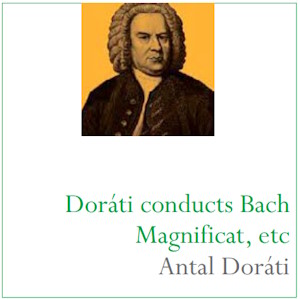
Johann Sebastian Bach 91685-1750)
Orchestral Suite No.2 in B minor, BWV1067 (1738-39)
Violin Concerto No.1 in A minor, BWV1041 (c.1720)
Magnificat in D major, BWV243 (c.1733)
Nathan Milstein (violin)
Elizabeth Harwood (soprano), Isabel Penagos (soprano), Alexander Young (tenor), Derrick Olsen (bass-baritone)
Monte Carlo Philharmonic Orchestra (suite)
Choir et Orchestre National de l’ORTF
rec. 13 September 1961, Grande Salle de Pavillon, Montreux (Concerto), 3 August 1963, Palais de Monaco (Suite); 24 April 1968, Théâtre de Champs-Élysées, Paris (Suite, Concerto)
Antal Doráti Society ADL331 [69]
There is no Bach in Doráti’s commercial discography, so far as I’m aware, and we don’t associate him with the composer, yet he clearly did conduct Bach in concert as this disc from the Antal Doráti Centenary Society illustrates. The three works derive from three separate concerts given during the course of the 1960s and there are top class soloists to provide ballast to what might otherwise seem a rather workaday piece of programming.
The Orchestral Suite No.2 in B minor is played by the Monte Carlo Philharmonic Orchestra at the Palais de Monaco in 1963 and features the eminent Japanese flautist Hirohiko Kato who made several LPs at this time, some of Bach, and some with this orchestra under Louis Frémaux – a Mozart Concerto, for instance. He also recorded Prokofiev and Hindemith’s Sonatas and formed a strong partnership with pianist Tadashi Kitagawa. He was a fine soloist with a most attractive tone, and he plays eloquently in this live performance, not least in his attractive phrasing in the Bourée and his agile Badinerie. The orchestra’s density of sound is par for the course in the 1960s.
Nathan Milstein is the soloist in the Violin Concerto No.1 in A minor, this time with the Orchestre National de l’ORTF and given as part of that year’s Montreux Festival. This was a work he recorded twice commercially, the first time with conductor Harry Blech in 1956 and then just over a decade later when Milstein directed the orchestra. I was rather surprised to see from the track listing that Milstein and Doráti took just over 3 minutes over the slow movement but this is actually a typo and they take a standard 6:25. Milstein plays with his accustomed savoir faire, his clarity and pristine address irradiating the music but never personalising it. Sometimes the orchestra’s lower strings are rather ‘congeally’ but soloistically all is well. There are a couple of audience coughers, inevitably in the slow movement.
The third work is the Magnificat in D major with soloists Elizabeth Harwood (soprano), Isabel Penagos (soprano), Alexander Young (tenor) and Derrick Olsen (bass-baritone). The opening movement is finely played, and up to tempo, with taut trumpets, and whilst some other movements now sound slightly slack when measured against early instrument performances, they wouldn’t have seemed so at the time, except perhaps Doráti’s tendency for rather excessive rallentandi. The soloists are well matched, the duet in Et misericordia being especially fine, though the Swiss bass-baritone Derrick Olsen is rather blustery in Qui fecit. Harwood and Penagos exemplify the warmth and dedication of the performance in their duet in Suscepit Israel. The large orchestra and chorus are not ideally clear in the broadcast sound but otherwise this is a strong, devout performance.
As usual from this source there are no notes.
Jonathan Woolf
Availability: Doráti Society (email)


















